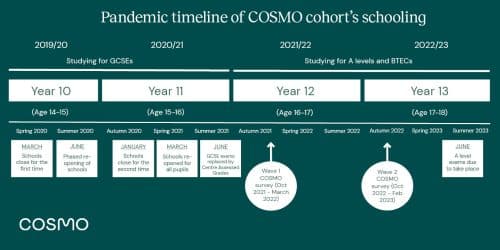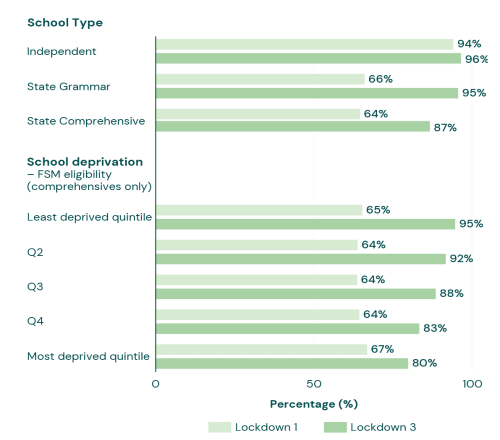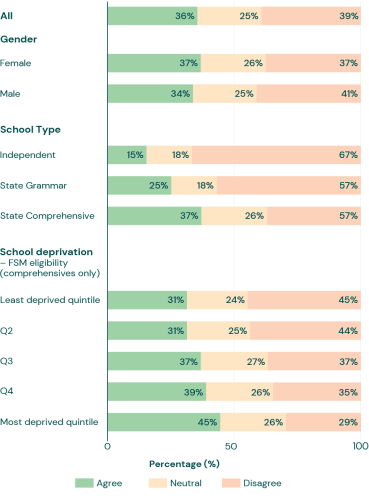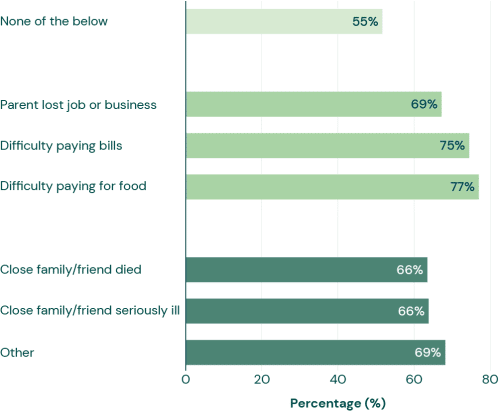Opinion
Today sees the publication of the first findings of the COVID Social Mobility and Opportunities (COSMO) Study. The project began during the initial stages of the pandemic, and has seen the launch of a new national longitudinal study of young people in unprecedented circumstances. This country has a rich history of longitudinal studies, from the 1946 National Survey of Health and Development to the Millennium Cohort Study, and it is exciting to add COSMO to a venerable list.
The challenges faced by young people over the last few years have been generation-defining. At a crucial stage in their young lives they have faced a level of disruption to day-to-day life not seen outside of wartime. The pandemic has been all encompassing, impacting school, leisure time, social life, physical and mental health, family relationships, as well as household resources and experiences of poverty. COSMO attempts to tie many of these experiences together, establishing a robust picture on how life looked for this generation of 16/17 year olds in 2021/22, and allowing us to explore the pathways those lives take in the coming years.
COSMO cohort timeline 2019-2023
Social mobility is ultimately about pathways: in particular the different pathways that lives take depending on their starting point. By the time they reached the end of Year 11, as the COSMO cohort did in 2021, they will have faced drastically different barriers and experiences, depending on the household they grew up in. These inequalities have long since been baked in. But what previous Sutton Trust research has indicated, and what COSMO illuminates in further detail, is how those inequalities deepened during a time of crisis. Those with fewer resources, and receiving their education in institutions with fewer resources, were more likely to meet the now well-established barriers of lockdown learning: lack of access to learning devices, suitable places to study, private tutoring and advice on their future. After the initial shock to the education system, it was advantaged groups in society who were able to adapt quickest to the new reality.
Proportion of schools offering live online lessons, by school characteristics, lockdown 1 and 3
But what should also be acknowledged is that the last few years have not seen a ‘devil take the hindmost’ approach. Much work has been put in by parents, teachers, schools, charities, local and national government to try to protect children and young people from less well-off backgrounds from the worst effects of the pandemic. From the introduction of furlough itself and the Mutual Aid community groups that sprung up across the country in 2020, to the mass provision of laptops and tablets, to schools delivering meals and educational materials to pupils’ houses, and the National Tutoring Programme. This comes across in the COSMO data, with over half of pupils in the most deprived schools receiving laptops from their school, and those from the least advantaged backgrounds most likely to receive catch up support including one to one and small group tutoring.
But also clear is the scale of the challenge. Despite these efforts, over half of those who needed a device at the beginning of the pandemic still hadn’t received one by the end of the lockdown periods, those from less advantaged backgrounds are more likely to feel like they have fallen behind their classmates, and recent data from the Department for Education showed that a decade’s progress in narrowing the attainment gap had been reversed during this period. Future briefings from COSMO will also delve into the mental health crisis for teenagers that began during the pandemic, but has accelerated since.
Whether participants thought they had fallen behind their classmates, by gender, school type and deprivation level
Among the major open questions raised by the pandemic is ‘how will all this affect young people in the long term?’ Children and young people have shown great resilience over the last few years, but the changes to many of their life courses could be substantial. COSMO has been set up to provide the most detailed and best quality data on how this unfolds in the coming years, with the intention of following the cohort as they pass through university, apprenticeships, training and into the workplace. But a picture is already starting to form. A majority of young people reported that they have changed their education or career plans due to the pandemic. While no doubt many of these changes will be positive, with some young people gaining interests in new areas during lockdown, or reflecting on what is most important in life. However, the clear pattern once more is that those in the most disadvantaged groups, and those who faced the most barriers during the pandemic, were the most likely to change their plans.
Any change in career plans, by life events during pandemic
Today’s findings, across the three areas of lockdown learning, education catch up, and future plans only provide the very beginnings of the insights the COSMO study hopes to offer. As we speak, the second wave of the study is in the process of launching across the country, checking in with young people and their parents a year later to find out their experiences and understand the challenges they are facing, as we head into a winter amidst a crisis in the cost of living for families and businesses, and an overstretched health system. While the threat of the virus itself is no longer at the forefront of the nightly news, its impacts continue to be felt across society. None more keenly than the country’s children and young people. And COSMO will hopefully help us understand and react to these challenges that bit better.
Carl Cullinane is Director of Research and Policy at the Sutton Trust and Co-Investigator on the COSMO Study.



